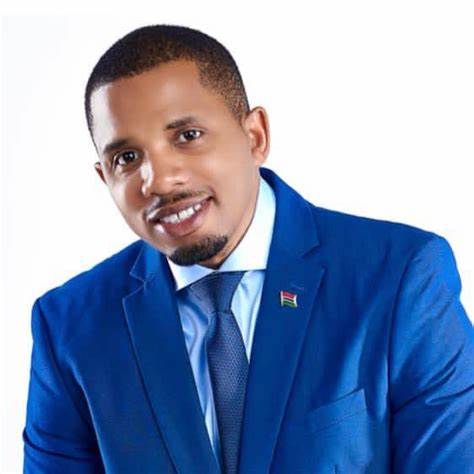
In George Orwell’s haunting novel 1984, the Ministry of Truth is not an agency of transparency but one of profound deceit, charged with rewriting history to suit the ever-shifting whims and caprices of a totalitarian regime. Orwell’s vision of a government that bends reality to fit its narrative, where war is peace and ignorance is strength, was a chilling fiction.
The Ministry’s chief function is to align all facts with the mutable whims of the ruling Party, ensuring that the public’s perception of reality is as malleable as clay in the hands of Big Brother. This dystopian nightmare was meant to serve as a dire warning, but as we turn our gaze to The Gambia’s Ministry of Information under the stewardship of Dr. Ismaila Ceesay, one might argue that Orwell’s dystopia is no longer confined to the pages of a novel — it is being enacted, with less artistry and more alarming fidelity, in real-time.
Though Orwell’s focus was primarily on the totalitarian regimes of the mid-20th century, particularly Stalinist Russia and Nazi Germany, his narrative appears eerily prescient in the context of The Gambia, where the decline of transparent governance and the rise of authoritarianism mirror the dark potentialities discussed by Thucydides in History of the Peloponnesian War.
Dr. Ceesay, who perhaps fancies himself as a scholar-statesman in the mould of Cicero, is, in reality, more similar to the Greek figure of Thersites—a buffoon known for his egregious ignorance and disruptive behaviour. His Achilles’ heel? A hubristic conviction that his academic credentials alone qualify him to steer the complex machinery of state communications singlehandedly .
Yet, his actions reveal a man ill-prepared for the subtleties of public administration, much less the nuanced role of a Minister of Information. The man has turned his ministry into a one-man show, disregarding the essential principle of division of labour, which is fundamental to any well-functioning government body.
Rather than leveraging the specialised skills of the Director of Press, the Government Spokesperson, and the various information officers, Dr. Ceesay has chosen to centralise control, making these roles redundant. In any effective government, these positions are crucial—they ensure that communication is clear, consistent, and reflective of the diverse expertise within the ministry.

However, under Ceesay’s stewardship, this division of labour has been upended, with him taking on tasks that should be delegated, resulting in a chaotic and inefficient flow of information. The Ministry, instead of being a collaborative effort, has become an echo chamber of Ceesay’s own voice, stifling the contributions of others and leading to a breakdown in the quality and reliability of government communication.
The role of the Ministry of Information is, or should be, to serve as a conduit between the government and the governed, providing accurate, timely, and relevant information to the public. However, under Ceesay’s watch, it has become something altogether different—a platform for self-aggrandisement and a propaganda tool.
In the style of a latter-day Narcissus, Dr. Ceesay seems more enamored with his reflection in the media than with the substance of his duties. Instead of fostering a transparent dialogue with the public, he has reduced the Ministry to a soapbox for his own monologues, where the lines between personal ambition and public service have blurred beyond recognition.
Orwell’s warnings about the dangers of unchecked power ring true here, as Ceesay has seemingly taken up the role of chief propagandist with a gusto that would make Joseph Goebbels nod in approval. Goebbels, who infamously manipulated media to serve the Nazi regime’s ends, turned the Reich Ministry of Public Enlightenment and Propaganda into a vehicle of lies that paved the way for unspeakable atrocities.
In his attempt to centralise control over government communication, Dr. Ceesay has under-utilised and undervalued the very professionals who are best equipped to manage the flow of information—the Director of Press, the Government Spokesperson, and the cadre of press officers within the ministry.
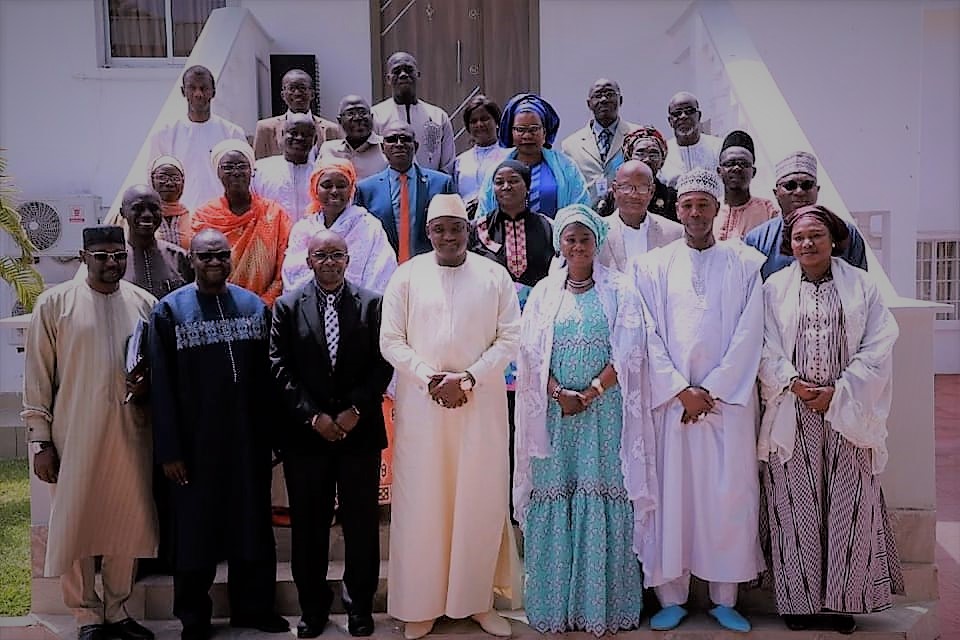
These individuals, reduced to mere hapless bureaucrats, are now as relevant as the proverbial fifth wheel. Like a one-man band, Ceesay insists on playing all the roles himself, yet the resulting cacophony is more noise than music. The Director of Press and other seasoned press officers, whose expertise could have been the Ministry’s greatest asset, have been relegated to the wings, their voices drowned out by the thunderous echo of Ceesay’s own.
This is not the deft orchestration of a skilled administrator but the ham-fisted efforts of a man out of his depth. But while disappointment is expected, surprise should be absent, as the man began his tenure with the wrong foot forward. Within the first 30 days of his tenure, Dr. Ceesay embarked on a crusade against the very media he is supposed to collaborate with, singling out Kerr Fatou Media in a display of ad hominem attacks more befitting a schoolyard spat than a ministerial address.
This was not the act of a seasoned statesman but of a man whose understanding of power is more informed by Machiavelli’s Il Principe than by democratic principles. “He who controls the narrative,” Ceesay seems to believe, “controls reality itself”—a dangerous illusion, as Orwell’s 1984 so vividly illustrates.
The Ministry of Information under Dr. Ceesay has faced criticism, particularly regarding a D40 million media contract awarded to seven media outlets. Ostensibly, this contract was to combat disinformation—a noble goal if executed with transparency and accountability. Instead, the entire process was shrouded in secrecy, conducted through a restricted tender process that raised more questions than it answered.
The lack of advertisement, the opacity of the selection criteria, and the dubious timing of the contract’s award have all drawn significant public ire. Instead of addressing the root causes of disinformation—such as the lack of trust in government communications—Ceesay has merely thrown money at the problem, hoping to buy silence rather than earn credibility.
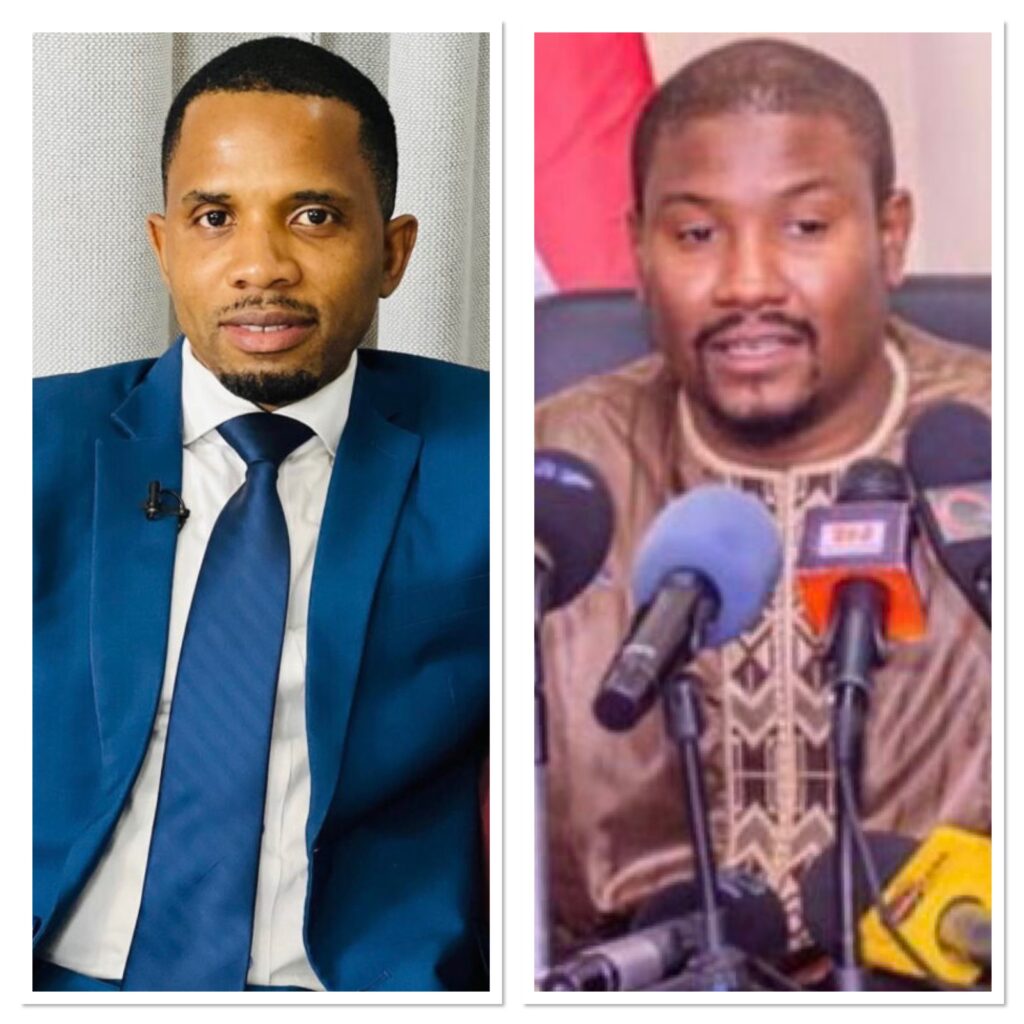
Dr. Ceesay’s tenure has been marked by a series of public relations blunders that suggest a profound misunderstanding of the role of a Minister of Information. His propensity for inserting himself into every public narrative, often at the expense of coherent policy communication, has transformed the Ministry into a circus of disjointed messaging.
This tendency brings to mind the figure of Mohammed Saeed al-Sahhaf, better known as Baghdad Bob, the infamous Iraqi Minister of Information whose declarations during the Iraq War, which blatantly contradicted observable realities, turned him into an object of ridicule.
While Ceesay has not yet descended into the outright absurdity of Baghdad Bob, the parallels are uncomfortably close. His insistence on dominating the airwaves, his antagonistic relationship with the media, and his apparent belief that visibility equates to effectiveness are all symptoms of a ministry in disarray.
What is perhaps most troubling about Dr. Ceesay’s approach is its inherent anti-intellectualism—a paradox given his academic background. Rather than fostering an environment of open debate and critical thinking, he has sought to stifle dissent and marginalise those who challenge his narrative. This is not the behaviour of a true intellectual but of a demagogue, more concerned with preserving his own power than with the pursuit of truth.
To label him a propagandist, a liar, a hypocrite, and a mediocre leader would still be far too kind. His actions have consistently undermined the very principles he should champion, demonstrating a profound disregard for the responsibilities of his office.
The Orwellian transformation of the Ministry of Information into a Ministry of Truth under Dr. Ceesay’s watch is not just a failure of leadership—it is a warning. A warning that when the lines between personal ambition and public service are blurred, when propaganda is allowed to eclipse the truth, and when those in power prioritise their own narratives over the needs of the people, the foundations of democracy itself are at risk.
In a nutshell, Dr. Ceesay’s stewardship of the Ministry of Information has been characterised by mismanagement, self-promotion, and a fundamental misunderstanding of the role of the Ministry, leaving a legacy of mistrust and dysfunction. His obsession with self-promotion has not only sidelined competent press officers and state media outlets but has also eroded public trust in the very institution he is supposed to lead.
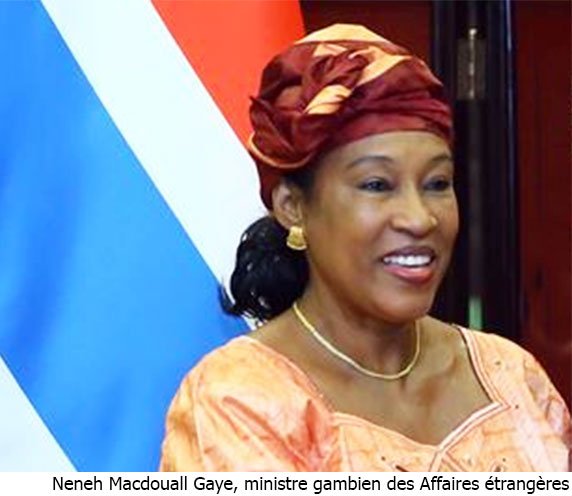
As Ceesay continues to pursue his political ambitions, one cannot help but recall the words of Jonathan Swift: “When a true genius appears, you can know him by this sign: that all the dunces are in a confederacy against him.” Yet, in Ceesay’s case, it seems the only genius in this confederacy is his ability to spin a narrative that suits his agenda, while the truth languishes in the shadows.
Who Is Really Dr. Ismaila Ceesay?
Dr. Ismaila Ceesay, once a distinguished lecturer at the University of The Gambia, was renowned for his outspoken critique of both the Jammeh and Barrow administrations. Celebrated as a paragon of academic bravery and intellectual integrity, his transition from the ivory tower of academia to the pragmatic world of politics has been nothing short of a dramatic anti-climax. His induction into Barrow’s cabinet has starkly exposed his shortcomings, casting him in the role of a hapless buffoon in a theatrical political farce.
In contrast to his predecessors —Neneh Macdouall-Gaye, Dr. Amadou Scattred Janneh, Sheriff Bojang, Demba Ali Jawo, and Ebrima Sillah, all seasoned journalists — Ceesay appears to be a dissonant note in a symphony of government communication. Despite his scholarly prowess, Dr. Ceesay’s tenure has often resembled a Sisyphean ordeal, where lofty ideals clash with the unvarnished realities of political stratagems.
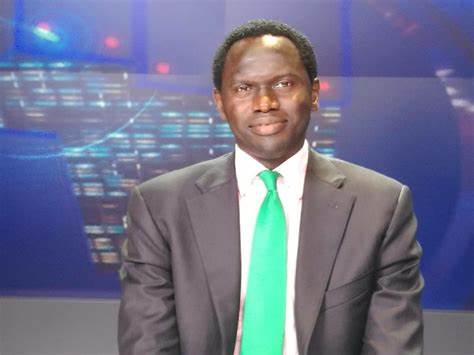
In a philosophical jest, he embodies the archetype of the “learned fool,” a prodigious scholar whose profound grasp of abstract theories starkly contrasts with his ineptitude in navigating the pragmatic demands of governance. The satirical irony of his situation lies in his being an “oracle of academia” now tasked with conducting the discordant orchestra of state-controlled propaganda.
Dr. Ceesay’s preoccupation with basking in the spotlight has come at the expense of his duties as a policy adviser. Rather than toiling in the shadows to formulate coherent media policies and strategies, he has chosen to monopolise the public stage, often without the necessary preparation or insight. This has led to a succession of communicative blunders, with his pronouncements frequently evoking the image of an academic’s ill-fated venture into the realm of public relations.
Given Ceesay’s conspicuous deficit in media expertise, his appointment by President Barrow is less a surprise than a revealing commentary. Barrow’s motive was not to recruit a transformative expert for the ministry but to achieve two principal political aims: to neutralise a former critic and to enlist him as a pliant attack dog.
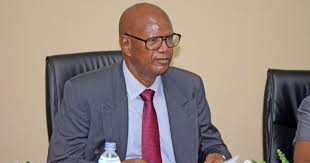
By all evidence, Barrow has skillfully achieved both objectives, highlighting a political strategy where competence is sacrificed at the altar of expedient loyalty.
Based on Ceesay’s performance record since taking office, it is evident that he is more a propagandist than a policymaker, more a thespian than a technocrat.
His focus appears to be on the theatricality of political spectacle rather than on substantive governance. Here are four recent instances that exemplify the troubling trajectory under Dr. Ceesay’s stewardship of the Ministry of Information:
Indications and Warnings
The Standard Newspaper | July 3, 2024
“Dr. Ceesay Urges Imam Fatty to Exercise Caution in His Statements on FGM” Dr. Ismaila Ceesay, the Minister of Information, advised Imam Abdoulie Fatty to be cautious with his public statements regarding Female Genital Mutilation (FGM), warning against remarks that could undermine national security.
The statement, seemingly rooted in an effort to maintain public order, reveals a deeper issue: Dr. Ceesay’s overreach in his ministerial capacity. As the head of the Ministry of Information, Dr. Ceesay has no legitimate authority to determine what constitutes a subversive statement. Issues related to national security and subversive activities fall within the purview of the Ministry of Interior and the Ministry of Justice—bodies equipped with the necessary legal and enforcement expertise.
Dr. Ceesay’s intervention in this matter is not only inappropriate but also dangerous. His attempt to assert control over public discourse on sensitive issues like FGM reflects a misunderstanding of the limits of his role. This incident exemplifies a concerning trend where the Ministry of Information, under Dr. Ceesay’s leadership, begins to assume powers it does not legally or ethically possess.
It’s reminiscent of the Ministry of Truth in George Orwell’s 1984—an institution that controls and manipulates information to serve the ruling party’s agenda. By stepping into the domain of national security, Dr. Ceesay is blurring the lines between state communication and authoritarian control, setting a dangerous precedent for the role of the Ministry of Information in The Gambia.
Kerr Fatou | May 28, 2024 “Dr. Ceesay on Barrow’s First 5 Years: A Transitional Phase, Not a First Term” In a bid to justify President Adama Barrow’s potential third-term candidacy, Dr. Ceesay characterised Barrow’s first five years in office as a “transitional phase” rather than a full term.
This statement is a blatant manipulation of the political narrative, designed to circumvent term limits and mislead the public. By rebranding Barrow’s initial five years as a mere transition, Dr. Ceesay attempts to invalidate the period as a legitimate term, thereby paving the way for an extended presidency under the guise of legality.
This redefinition of Barrow’s tenure is not only disingenuous but also undermines the democratic principles that should guide Gambia’s political landscape. Dr. Ceesay’s rhetoric reveals a calculated effort to distort the truth and manipulate public perception, much like the Ministry of Truth in Orwell’s dystopian vision. In 1984, truth is what the ruling party says it is—past, present, and future are rewritten to fit the narrative of the regime.
Dr. Ceesay’s narrative maneuvering mirrors this disturbing concept, as he seeks to alter the public’s understanding of political timelines and democratic norms to favour the current administration.
The implications of such manipulation are profound. If left unchecked, this could lead to the erosion of democratic safeguards and the entrenchment of power in the hands of a single leader.
Dr. Ceesay’s actions are a clear warning sign of a government moving towards authoritarianism, where the truth is moulded to fit the desires of those in power, rather than being an objective reality.
Gambiana | July 29, 2024 “Ceesay says Barrow shouldn’t apologize over death wish remarks against Darboe” Dr. Ceesay defended President Barrow’s controversial “death wish” remarks about opposition leader Ousainou Darboe, dismissing public outrage as an overreaction.
The President’s comments, which many perceived as inflammatory and unbecoming of a head of state, were downplayed by Dr. Ceesay, who sought to neutralise the backlash by trivialising the concerns of the Gambian populace.
This defence is not just an attempt to shield the President from criticism; it’s an alarming example of how the Ministry of Information is increasingly being used to normalise dangerous rhetoric.
By defending the indefensible, Dr. Ceesay is not just excusing harmful behaviour but is also tacitly endorsing the erosion of civil discourse. His stance suggests that the government, under his watch, is more interested in silencing dissent and controlling the narrative than in addressing legitimate public concerns.
This scenario is a textbook case of Orwellian doublespeak — where words are used to obscure, distort, and ultimately control the reality experienced by the public. In 1984, the Ministry of Truth excels at this, turning lies into truth and truth into lies. Similarly, Dr. Ceesay’s justification of President Barrow’s remarks is an attempt to reshape reality to fit the government’s agenda, ensuring that any dissenting voices are drowned out by the official narrative.
This manipulation of language and meaning is a direct threat to democracy, as it undermines the possibility of honest and open debate, replacing it with a controlled, state-sanctioned version of events.
Gambiana | August 5, 2024 “Dr. Ceesay Criticizes Mayor Bensouda for Failing Bundung Residents Over Garbage Collection”. Dr. Ceesay publicly criticised Mayor Ahmed Talib Bensouda for inadequate garbage collection in Bundung, shifting blame for local governance issues onto the Mayor’s shoulders.
While addressing local concerns is crucial, Dr. Ceesay’s intervention in this matter is a stark overstep of his ministerial boundaries. The Ministry of Information is not responsible for local governance or municipal service delivery; these responsibilities lie with local authorities, who are better positioned to address such issues.
Dr. Ceesay’s decision to publicly criticise Mayor Bensouda not only undermines the authority of local officials but also distracts from his primary role as a communicator of government policies and initiatives. It reflects a troubling lack of understanding of the complex relationship between central and local governments.
Furthermore, it suggests that the Ministry of Information, under Dr. Ceesay’s leadership, is increasingly being used as a tool for political point-scoring rather than as an institution focused on transparency and effective communication.
This overreach is yet another example of how the Ministry of Information is straying from its intended purpose, echoing the operations of Orwell’s Ministry of Truth.
By involving himself in matters beyond his remit, Dr. Ceesay is not only diluting the effectiveness of his ministry but also contributing to the confusion and misinformation that he should be combatting. The role of the Ministry of Information should be to clarify, not to obfuscate, yet under Dr. Ceesay, it appears to be doing more of the latter.
Comprehensive Critique
Dr. Ismaila Ceesay’s recent statements and actions, as reported across various Gambian news outlets, paint a troubling picture of a Minister who is increasingly overstepping his boundaries, manipulating narratives, and misusing his position. The Ministry of Information, under his leadership, seems to be evolving into an entity reminiscent of Orwell’s Ministry of Truth — a body more concerned with controlling and distorting the narrative than with providing transparent and accurate information.
Dr. Ceesay’s interventions in matters beyond his jurisdiction, his defense of controversial statements, and his public criticisms of local officials are indicative of a broader trend towards authoritarianism and the erosion of democratic norms in The Gambia. His tenure reflects a concerning shift where the role of information dissemination is compromised by political manipulation and personal ambition
Final thoughts
Dr. Ceesay’s tenure can be scrutinised through the lens of the Indications and Warning (I&W) framework, a tool used in the intelligence community to evaluate risks. This framework does not predict specific events but provides early warnings and alerts about shifting probabilities of risk.
Applied to Dr. Ceesay’s role, it reveals a troubling trajectory where the Ministry of Information appears to be moving towards increasing dysfunction rather than reform. This analysis underscores the need for a reassessment of his role, with a focus on transforming his approach from political spectacle to effective governance.
If the president were to reconsider Dr. Ceesay’s placement, redeploying him to the Foreign Services might prove advantageous. His adeptness at manipulation and strategic positioning could serve well in diplomatic engagements, where the art of persuasion is paramount. Such a move would not only better align his skills with his role but also mitigate the adverse impact of his current missteps.
Repositioning Ceesay could offer him an opportunity to leverage his academic insights in a more suitable context, potentially enhancing The Gambia’s international relations. Ultimately, this realignment might restore a semblance of functional efficiency to the Ministry of Information while capitalising on Ceesay’s existing talents.
By Arfang Madi Sillah,
Washington DC
Disclaimer:
The views expressed in this article are entirely those of the author and do not necessarily reflect the official policy or position of any affiliated institutions or organizations. The author takes full responsibility for the opinions and analysis presented herein. The author holds several academic degrees, including an undergraduate degree in English literature and literary theory.










Recent Comments